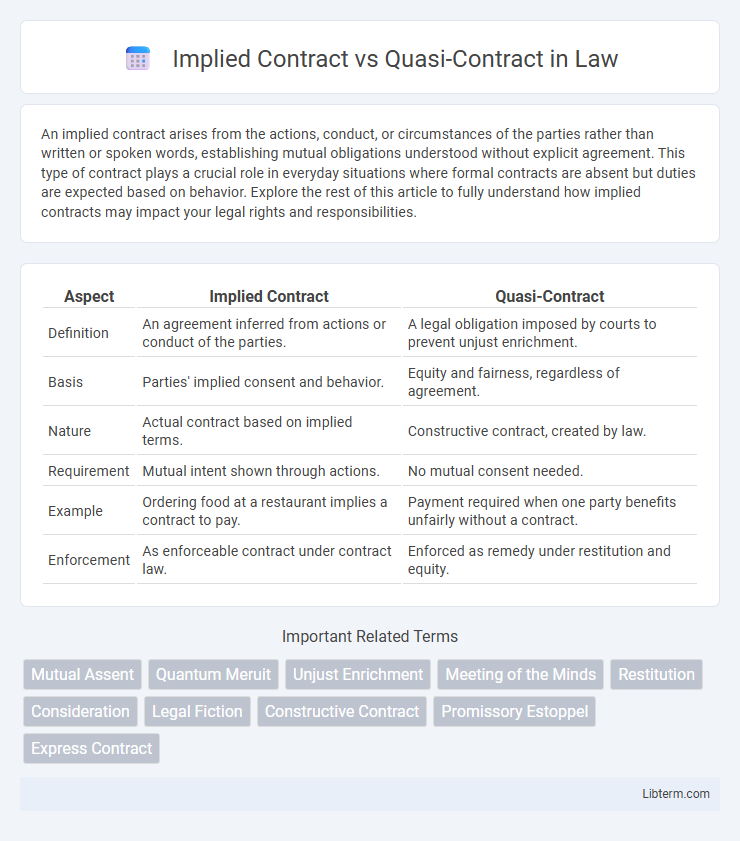An implied contract arises from the actions, conduct, or circumstances of the parties rather than written or spoken words, establishing mutual obligations understood without explicit agreement. This type of contract plays a crucial role in everyday situations where formal contracts are absent but duties are expected based on behavior. Explore the rest of this article to fully understand how implied contracts may impact your legal rights and responsibilities.
Table of Comparison
| Aspect | Implied Contract | Quasi-Contract |
|---|---|---|
| Definition | An agreement inferred from actions or conduct of the parties. | A legal obligation imposed by courts to prevent unjust enrichment. |
| Basis | Parties' implied consent and behavior. | Equity and fairness, regardless of agreement. |
| Nature | Actual contract based on implied terms. | Constructive contract, created by law. |
| Requirement | Mutual intent shown through actions. | No mutual consent needed. |
| Example | Ordering food at a restaurant implies a contract to pay. | Payment required when one party benefits unfairly without a contract. |
| Enforcement | As enforceable contract under contract law. | Enforced as remedy under restitution and equity. |
Introduction to Implied and Quasi-Contracts
Implied contracts arise from the conduct or circumstances of the parties, indicating mutual consent without explicit written or spoken terms. Quasi-contracts, also known as implied-in-law contracts, are judicial constructs imposed to prevent unjust enrichment when no actual agreement exists. Both concepts serve to enforce fairness and obligations where formal contracts are absent or incomplete.
Definition of Implied Contract
An implied contract is a legally binding agreement formed through the actions, conduct, or circumstances of the parties involved rather than explicit written or spoken words. Unlike express contracts, implied contracts rely on the reasonable expectations and behavior indicating mutual consent. Courts enforce implied contracts when the parties' intentions can be inferred from their performance or relationship, ensuring fairness in transactions lacking formal agreements.
Definition of Quasi-Contract
A quasi-contract is a legal construct imposed by courts to prevent unjust enrichment when no actual contract exists between parties. Unlike implied contracts, which arise from the parties' conduct suggesting mutual agreement, quasi-contracts are obligations created by law to ensure fairness. This remedy compels one party to compensate another when benefits are conferred under circumstances lacking express consent.
Key Elements of Implied Contract
An implied contract arises from the conduct, actions, or circumstances of the parties indicating mutual agreement without explicit words, focusing on key elements such as mutual assent, offer and acceptance inferred from behavior, and consideration evidenced through exchanged benefits. Unlike quasi-contracts, which are imposed by law to prevent unjust enrichment, implied contracts depend on actual intent and established obligations inferred from facts. Essential to implied contracts is the clear demonstration that parties intended to create a binding agreement, even if not expressly stated.
Key Elements of Quasi-Contract
Key elements of a quasi-contract include the presence of a benefit conferred upon the defendant by the plaintiff, an appreciation or knowledge of that benefit by the defendant, and the acceptance or retention of the benefit under circumstances that make it inequitable for the defendant to retain it without payment. Unlike implied contracts, quasi-contracts are not based on the parties' intent but are imposed by law to prevent unjust enrichment. This legal construct ensures restitution when no actual agreement exists between parties.
Legal Basis and Formation
Implied contracts are formed based on the parties' conduct and circumstances indicating mutual agreement, grounded in contract law principles requiring offer, acceptance, and consideration. Quasi-contracts arise by operation of law to prevent unjust enrichment, lacking actual agreement but imposing obligations as if a contract existed. The legal basis of implied contracts lies in consensual obligations, whereas quasi-contracts rest on equitable doctrines to ensure fairness where no formal contract is present.
Differences Between Implied and Quasi-Contracts
Implied contracts arise from the conduct of parties that indicate mutual agreement without explicit words, whereas quasi-contracts are judicially imposed obligations to prevent unjust enrichment in the absence of any actual agreement. Implied contracts depend on the parties' intentions inferred from circumstances, while quasi-contracts do not require intent but are created by law to ensure fairness. The key difference lies in that implied contracts are actual agreements inferred from actions, contrasted with quasi-contracts which are equitable remedies enforced by courts.
Real-World Examples of Each Contract Type
An implied contract is illustrated by visiting a doctor for treatment without explicitly discussing payment terms, where payment is expected based on customary practice. A real-world example of a quasi-contract occurs when a homeowner mistakenly receives and uses another person's materials, obligating them to pay for the value of those materials despite no formal agreement. These examples highlight how implied contracts arise from conduct within established business relationships, while quasi-contracts are judicial remedies to prevent unjust enrichment.
Legal Remedies and Enforcement
Implied contracts are enforceable based on parties' conduct indicating mutual agreement, allowing legal remedies such as damages or specific performance when a breach occurs. Quasi-contracts, or unjust enrichment claims, provide remedies by imposing obligations to prevent one party from unfairly benefiting at another's expense, despite no true agreement. Courts enforce implied contracts by interpreting actions consistent with intent, while quasi-contracts are imposed by law to restore fairness through restitution or equitable relief.
Conclusion: Choosing the Right Legal Recourse
Selecting between an implied contract and a quasi-contract depends on the specific circumstances of the case and the evidence of mutual consent or unjust enrichment. Implied contracts are based on inferred agreements from actions or conduct, whereas quasi-contracts are imposed by law to prevent unfair benefits without consent. Legal practitioners must carefully assess contract formation elements and equitable principles to determine the appropriate remedy for dispute resolution.
Implied Contract Infographic

 libterm.com
libterm.com